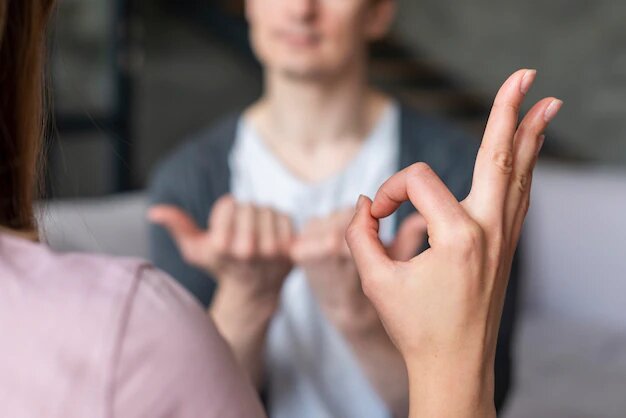
Silent wisdom, Shared stories:
Bridging worlds through experience
We gather powerful stories from the deaf and hard of hearing
community around the Netherlands, and transform their challenges and solutions into bridges of understanding, empowering both
storytellers and listeners to shape a more inclusive future.
Hear our stories
Stories
Your voice matters, even when it isn't heard in the traditional way. At Silent Storytellers, we believe that stories are powerful. They build bridges, spark understanding, and remind us that we are not alone. That's why we've created a dedicated space where members of the deaf and hard-of-hearing community can share their journeys.
Whether you were born deaf or became deaf later in life, your story deserves to be seen and acknowledged. We welcome experiences of resilience, identity, challenges, triumphs, and everyday life. These stories aren't just personal, they're educational and transformative for everyone who reads them.
By contributing your story, you help others feel connected, inspired, and informed. You raise awareness of the emotional, social, and communication challenges that often go unseen. And most importantly, you help shape a more inclusive and compassionate world. We invite you to write from the heart, in your own words, in your own way. Together, let's make sure every story is heard.
About Us 
We are Silent Storytellers, a dedicated team of seven IT professionals united by a shared mission: to use our skills and passion to create meaningful change in the world. We take on challenging projects that aim to make a real difference, not just in the tech space, but in people's lives. Our current focus is close to our hearts, creating solutions for the deaf and hard-of-hearing community. We believe that those who navigate a world built for hearing without the ability to hear are true everyday heroes. Through this project, we hope to break communication barriers, raise awareness, and offer tools that make life more inclusive and accessible. Technology speaks volumes, and we're here to make sure it speaks for everyone.
Our Game 
Silent Storytellers is a motivated group of students who took initiative in creating an immersive Virtual Reality (VR) experience our game called "Deafinity" that allows users to step into the world of deaf individuals. Our goal is to foster empathy and understanding by simulating the real-life challenges that people who are deaf face every day, whether at school, in the workplace, or in public spaces. Through a combination of advanced technology, authentic storytelling, and collaboration with the sign language interpreter and the members of the deaf community, this project strives to raise awareness and spark meaningful conversations around inclusion and accessibility. Our team of seven IT students, supported by experts and firsthand stories from the deaf community, is committed to delivering a high-quality, thoughtful product.
We developed multiple realistic VR environments and gathered feedback from both deaf individuals and members of the public to ensure the experience is impactful and educational. At its core, "Deafinity" reflects our belief that technology can be a force for good, a tool to elevate unheard voices and build a more compassionate, informed society.
Did you know?
- In English, "Deaf" with a capital D refers to Deaf culture, while "deaf" with a lowercase d refers to the medical condition of deafness.
- Not all deaf people know sign language, many born into hearing families aren't given the opportunity to learn it while growing up.
- Only about 10% of deaf people are born into deaf families, while the remaining 90% come from hearing families and are introduced to deaf culture later in life.
- There's a research project at Utrecht University of Applied Science to map the different needs, preferences and challenges of deaf, hard hearing and deafblind in using NGT (Dutch sign language)
- SignLab Amsterdam is a research organization founded in 2020 at the University of Amsterdam aims to leverages artificial intelligence, computer vision, and computer graphics to enhance sign language research.
- Good lighting is essential for conversations with Deaf or hard-of-hearing individuals, as lip reading and facial expressions play a big role in communication.
- “De Gelderhorst” is the national centre for older deaf people in the Netherlands
- Deaf culture has its own humor.
- Men are almost twice as likely as women to have hearing loss among adults ages 20-69.